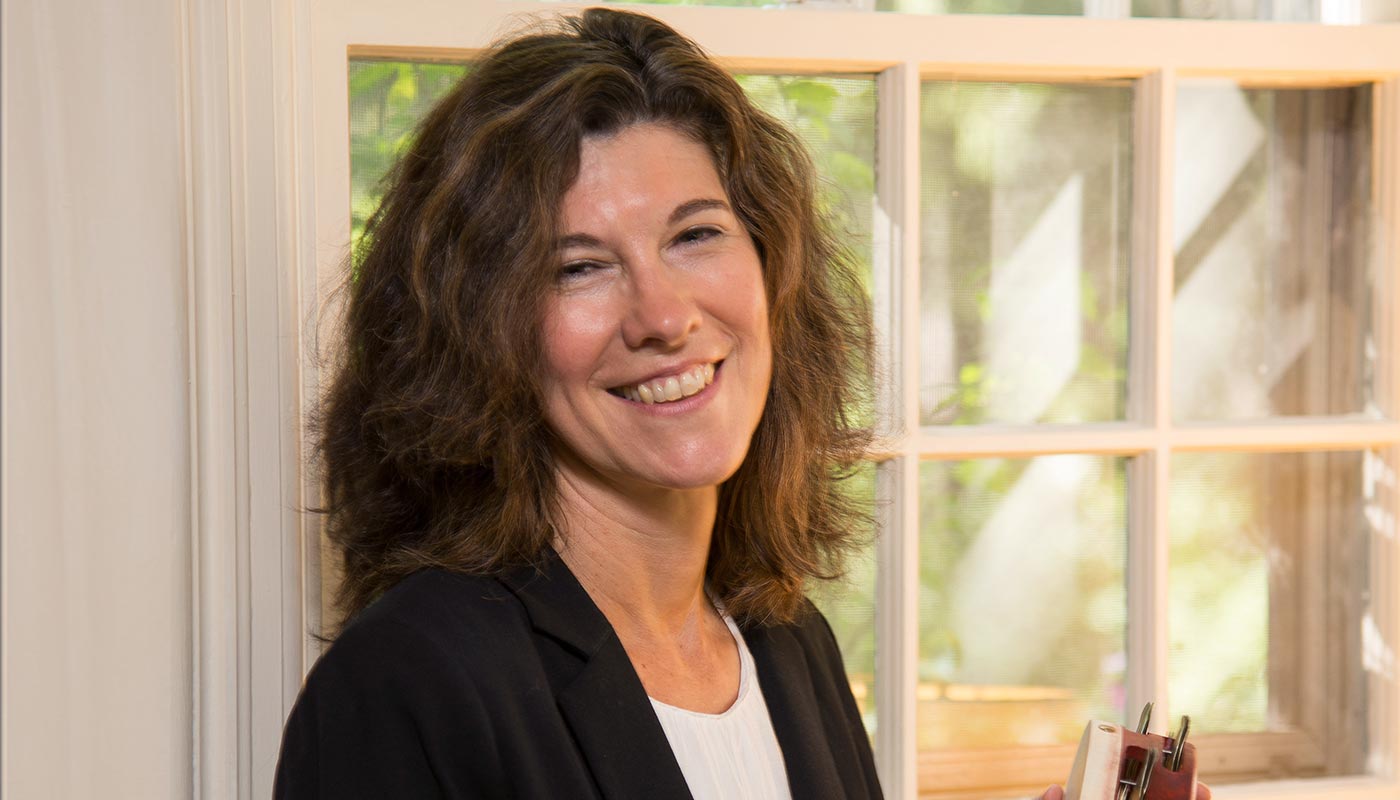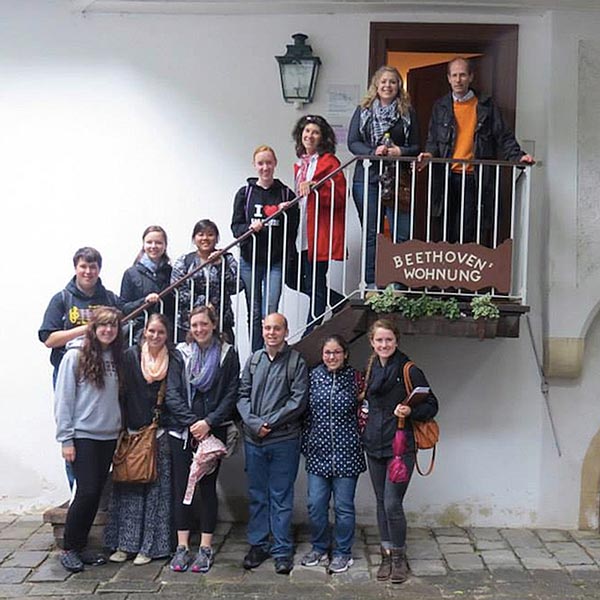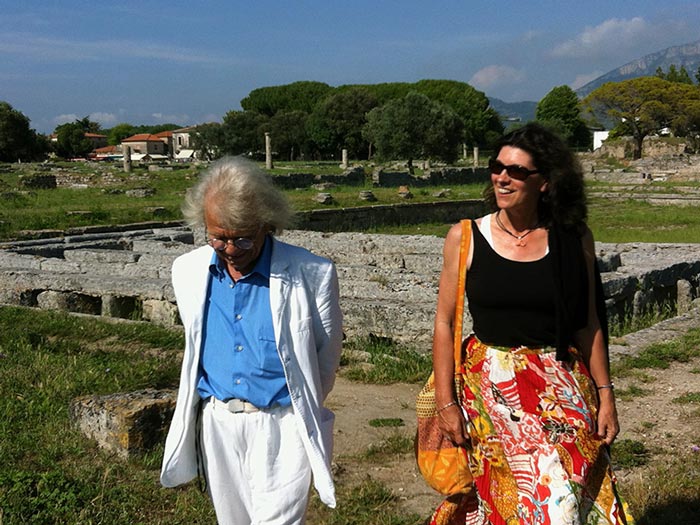
Why music history
Marjorie Roth was born into a musical family. She still has a recording of herself singing in parallel thirds — a form of harmony — with her mother at only 18 months old. "I was always good at music, but standing up in a dress and playing a recital was never my favorite thing to do, although I loved to play my flute and I loved rehearsing with other people. During my junior year as an undergraduate, I took my first music history class, and within two weeks I realized that this was what I wanted to do. For the first time, I understood the art of music as more than just sound, how it affected the lives of people, politics, religion, etc. I didn't even know being a music scholar was possible until I went to graduate school. I just knew I loved to read, research, write papers, think about and analyze music, and contemplate the meaning of music in human lives."
Why Nazareth
Roth taught studio flute at Nazareth part-time starting in 1985 until accepting a full-time position as a music historian in 2000. "Nazareth kept me alive while I was in graduate school, as a part-time faculty member. I worked here a lot, and I built up one heck of a resume. Later, when looking for a full-time job, I got some great career advice from one musicologist with similar interests to mine. He told me to find a small, liberal arts college that would encourage me to do the research I was interested in, instead of pressuring me to publish what would 'sell' most."
"Nazareth's School of Music is unique. At larger universities, the different music specialties are often siloed. At Naz, all of us are in the same room. We meet every other Friday morning and decide together which direction this school will take. My job, as a member of this school, is to take my specialty areas and figure out how to make them harmonize with all the other areas, make them meaningful to colleagues with specialties in other areas."
"There are some very talented students at Naz. Students here have so much awareness of music as something more than just repertoire. When I was offered the full-time position here, I knew this was exactly what I wanted. Naz music students are very interesting people who are open to learning, they have a naturally global understanding of music."
Making music
"I have 49 years of teaching experience in the flute studio, so I've seen it all. I had a very good teacher who taught me how to fix very specific technical problems. I enjoy working with students who come in with difficulties as flutists. Music students are under so much pressure; it doesn't help when they think they have to come in, make music, and be someone they're not just to measure up to some abstract high standards. That kills the individual creative impulse. So I de-emphasize competition as a motivation for performance in my studio. I emphasize instead expression and spiritual and personal development as the best reasons for making music."
What to expect from Roth
"In the first year of music history, the students work very hard and have to study a lot. They memorize, think critically, write, and learn the basics of historical research. It's much like studio work, really. As performers they have to learn fingerings and scales before they can play music. As history students they have to learn facts and genres before they can think clearly and critically about their art. Students also need to ask questions, which I always love. It leads to so many fun and interesting discussions in class. Although I have to be hardcore about the mastery of facts during their first year of music history, students can make the lectures really fun by participating in discussions."
"For upper level courses, I guide the discussions to make sure they are relevant to the course, but ultimately, the students go out, find the things they want to read, and then come back and report to the class. These courses allow students to build upon what they learned in their first-year history courses. Once they have mastered the facts, it's time to go out and have some fun playing with the ideas."
"I'm really enthusiastic about music history, and I think it's infectious. Students do come into my courses intimidated sometimes. But I manage to reduce their anxiety with my enthusiasm and by being honest with what I expect from them. I also try to give each student a chance to connect music history to their specific discipline and career goals. That makes the class much more meaningful to them."
Going global
Every other summer, Roth co-teaches a three-week Music and Culture in Austria and Germany with Austrian musicologist Michael Malkiewicz. "Many of the students who come in as music education and music therapy majors have such rigorous and packed programs that they can never study abroad. This class allows them to earn credits toward their degree while doing something that they normally would not be able to fit into their schedules. It involves 24/7 exposure to music and culture in three major cities — Salzburg and Vienna. Michael Malkiewicz organizes the class trips, and because he lives in Austria we get into places that tourists never get to see. It's always so exciting for students to actually see the places they've read about in their history books. It all comes alive for them on this trip."

With students at Beethoven's Heiligenstadt residence in Vienna, 2014
Courses I teach
- Freshman Orientation to Careers in Music
- Survey of Western Music Literature from Antiquity to 1600
- Survey of Western Music Literature from 1600-1870s
- Music as a Liberal Art
- Music Research & Writing I
- Music & Gender
- Music & Culture in Austria
- Music, Art, & Magic in Western Culture
- Flute Studio Lessons, Flute Choir, Chamber Music coaching, degree recital preparation
- Introduction to Western Classical Music
"I especially enjoy teaching the first-year music history class because of its repertoire. Most of the music majors who come to Nazareth will have never listened to Gregorian chant or Renaissance motets. Students always say 'Wow! I never knew this existed!' I really like that."
Study Abroad
Fun Fact
"I was a relatively poor student before college. My mom dragged me, kicking and screaming, to kindergarten, and I continued that attitude right through high school graduation. I worked in a field the summer after high school, picking beans, and that's what I wanted to do forever. Then my mom came one day with my flute in the back of the car, pulled me out of the field, and brought me to the college where I ended up studying. I played an audition in my dirty overalls and was accepted. I still told my mom, 'I'm not going!' But two weeks into my first semester, I realized that college was a pretty great idea."
Student Perspective
"Dr. Roth has opened doors of understanding in my mind that transcend music. Through her stories and explanations about composers, music, and cultures, I found mesmerizing connections that resonated personally with all the material she taught. Her vocation and her dedication to her students are beyond belief. She is demanding in all the best ways, and makes striving for excellence feel as natural as being alive. I feel very lucky to have had the opportunity to be her student. She's a shining example of what a professor should be."
— Aaron Siebert-Castiñeira ’19, a composition and piano performance major who's also in the Nazareth honors program that Roth directed
Roth's accomplishments
- Edited "Explorations in Music and Esotericism" (2023), a scholarly book exploring from many fresh angles the connections between two rich strands of human culture — music and esotericism — with examples from the medieval period to the modern age.
- Fulbright grant for research in Vienna, Austria (1998-1999)
- Named Master Teacher by the American Musicological Society Committee on Career-Related Issues, 2010
- Presented her research around the world, in places such as in Sicily, Egypt, Iceland and Portugal
- National Endowment for the Humanities grant to create a new course devoted to the value of a liberal arts education
- Past President of the Rochester Flute Association
Student Perspective
"Dr. Marjorie Roth is deeply knowledgeable, and my experiences as her student have been profound. She was my teacher for Honors Orientation, where she inspired me that I could find a way to make connections and include all of my favorite disciplines into an honors thesis. If it weren't for her knowledge, wisdom, humor, and inspiration, if it weren't for the amazing opportunities, I may not be where I am today. While studying abroad with her, learning about music and culture in Austria and Italy, it hit me that I needed to change majors. With Dr. Roth's support and expertise, I now believe I can be whatever I want to be, whether it be a chaplain, a scholar, or a college professor — ultimately helping others by sharing my passions with the world."
— Ceara Curry ‘18, double majoring in music and religious studies with minors in interfaith studies, music history, and the honors interdisciplinary program

Visiting ruins in Paestum, Italy 2013, with Lars Mogensen, a retired philosophy professor who runs a retreat for scholars. Marjorie Roth was at the retreat for two weeks working on a paper to present at a conference in Sicily.
Life of the Mind
Read how musicology and esoteric studies intersect for Dr. Roth.
Faculty Spotlights
Wondering who else you can learn from — and who will support and challenge you? Check out Faculty Spotlights.